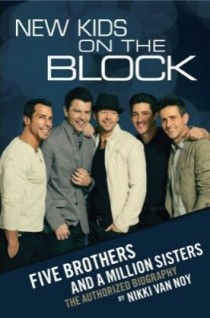 I should take offense to the title of this book.
I should take offense to the title of this book.
I am-somewhat unashamedly-a New Kids on the Block fan. I am also a guy. A black guy, to boot. Of course, my deficit in the heterosexuality department might explain some of my NKOTB fandom, but I’ll further confuse you by noting that I currently don’t, and never did, find Donnie, Danny, Jordan, Jonathan or even Joey dreamy, or even attractive. So, yeah, it’s weird. I’m a dude, there were no teenage crushes, and I still rep the New Kids.
Why? I dunno. Because, believe it or not, Hangin’ Tough is still a pretty decent pop album, and it hasn’t aged as awfully as one might think. Because I think Jordan Knight’s a pretty good singer. Because I respect the fellas’ (particularly Donnie Wahlberg)’s reverence and respect for black music and culture. Because I think if Face the Music had been released by any other group, it would have gotten critical praise and gone Platinum. Since the fivesome reunited four years ago, I’ve seen them in concert twice, and when I found out that there was an authorized biography coming out of the group, I hit Amazon.com up and ordered that baby right away. Even though I’m not one of the million “sisters” they refer to (although, much like Canibus said about LL Cool J, 99% of their fans-give or take 3 or 4%-wear high heels.)
Anyhow, Five Brothers is the story of how the New Kids became a pop phenomenon in the late Eighties and early Nineties. It follows the members from their roots in late ’70s/early ’80s Boston, to their union under the aegis of producer Maurice Starr, through the multi-platinum success they attained with Hangin’ Tough (after suffering through a dud debut) and so on. There’s not much here you won’t already know if you’re a fan of the group, but to read it through the words of the individual members and their family members (many of whom contribute to the book) makes for a succinct, and somewhat interesting, read.
There’s not a whole lot of “Behind The Music” fodder here: the worst that happens is that a couple of members admit to having abused alcohol for a period of time after the band split. They throw light shade at Maurice Starr, suggesting that the image of him as a Svengali-type was inaccurate (Starr, interestingly, did not contribute to the book.) They don’t run from mild controversies like the lip-syncing allegations that plagued them later in their career, and they frankly discuss the racial politics that factored in to their images, their sound, and their success. Even Jon Knight’s homosexuality-quite possibly the most tabloid-esque fact about any of the group members- is given a mild shrug. Jon admits that he was struggling with it in the early Nineties, when the Kids were at their peak, and then it’s not discussed again.
One thing you’ve got to give the New Kids props for is the faithfulness of their fan base. Those girls (and a handful of guys) who were 15 or 16 when Hangin’ Tough came out are now in their mid-late thirties and still going to see concerts, still ponying up big dough to see the New Kids cruises. They acknowledge those fans in the book, and a select few “Blockheads” contribute written testaments to their continual love of the group.
I don’t necessarily know that you’ll finish reading Five Brothers and come away with any new appreciation of the group’s music, but you’ll certainly respect them as people and businessmen. I enjoyed the book-hell, I finished it in a day-and it was good enough to get me to go back into my collection and spin some of the NKOTB’s golden oldies. If you can still recite the bridge of “Step By Step” by memory, then Five Brothers & A Million Sisters should find its’ way into your book collection.
Grade: B

3 comments
Illani says:
Oct 17, 2012
thank you
John says:
Oct 18, 2012
I’ve been a fan since “Please Don’t Go Girl,” and like you I’ve been impressed by not only their soul influences but also their respect for those that have preceded them. And I couldn’t agree more with your assessment of Face the Music. I saw them two years ago, and the number of 30 and 40 somethings cracked me up. Apparently we’re not the only ones still hangin’ tough.
blerd says:
Oct 18, 2012
Nope. It’s when everyone comes out and relives 1989!!!